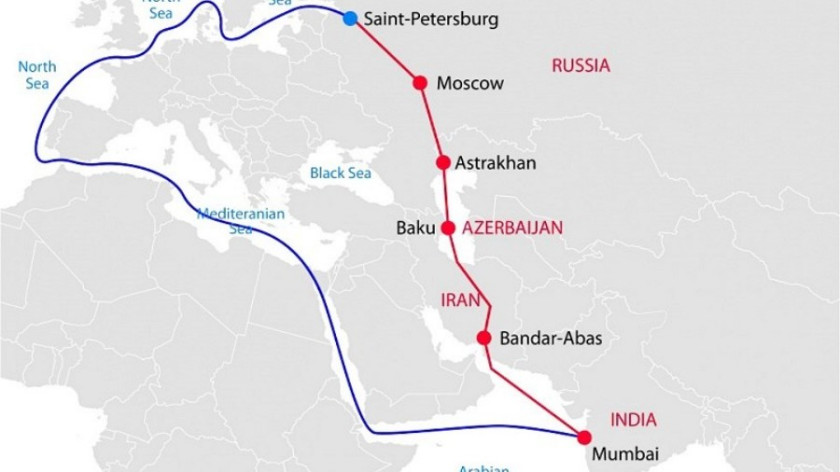
By Nijat İsmayilov
The geopolitical importance of regional economic and transport communications projects has greatly increased in the international relations system.
The International North-South Transport Corridor (INSTC) project, which has grabbed the international attention, is one of the most promising geopolitical and geo-economic opportunities.
The purpose of this project is to unite South Asia (more precisely, yet only India) with the Middle East, the Caucasus, Central Asia, Russia and Europe.
The project was initiated in 2000 in St. Petersburg by Russia, Iran and India. In recent years, 13 nations have signed the agreement and ratified it. These are Azerbaijan, Belarus, Bulgaria, Armenia, India, Iran, Kazakhstan, Kyrgyzstan, Oman, Russia, Tajikistan, Turkey and Ukraine.
The purpose of the corridor is to reduce the time of delivery of goods from India to Russia, as well as to Northern and Western Europe. Delivery time of the current route (the Suez Canal) is 45-60 days and is expected to be 14-20 days through the North-South.
This project has particular importance for the economic integration of Eurasia. Currently, the transport of the countries of South Asia, especially India with the Europe and the Middle East, are operated only via the Suez Canal. Trading through the Suez Canal is often time consuming (over 6 weeks) and expensive.
The region around the canal is characterized by instability, especially after the Arab Spring, and is not a reliable route for safety. It is predicted that the INSTC will be the main alternative corridor to Suez.
The project planned in not only the direction of Northern and Western Europe-Russian Federation, but also in other three directions:
Caucasus – Persian Gulf (Western route);
Central Asia – Persian Gulf (Eastern route);
Caspian Sea – Islamic Republic of Iran – Persian Gulf (Central route).
Azerbaijan in the International North-South Transport Corridor
Azerbaijan joined the North-South project in 2005, and the construction of the Azerbaijani part of the corridor has already completed. Thus, a 9.7 km railway line and 82.5 m long bridge were built between Azerbaijan’s Astara station and Iran’s Astara station.
Azerbaijan Railways CJSC also builds a 35-hectare cargo terminal in Iran and leases it for a 25-year and 1.4-kilometer-long railway line from the border to the terminal for 15 years.
The biggest obstacle to the implementation of the INSTC was the poor railway infrastructure between Iran and Azerbaijan, which has a key geographical role in the project.
For the project to be realized, the railway system of Azerbaijan and Iran had to be interconnected. Therefore, on March 28, 2018, an agreement between the Republic of Azerbaijan and the Islamic Republic of Iran on financing the construction of the Astara-Rasht railway section in the Islamic Republic of Iran was signed during the visit of the President of the Islamic Republic of Iran to Azerbaijan.
Overall, the construction of the 365-kilometer Astara-Rasht-Kazvin railway will be one of the most important events in the history of the INSTC. In addition to the revenues, the project will further boost Azerbaijan’s importance in international transit and trade and will intensify the trade turnover with the Caspian countries.
Perspectives of Pakistan joining the International North-South Corridor
Pakistan is geostrategically indispensable for the project. However, Pakistan’s failure to join the project is currently due to two reasons: the Kashmir problem that exists between India, China and Pakistan, and the China-Pakistan Economic Corridor between Pakistan and China – an important part of the Silk Road project initiated by China.
As it is known, the China Belt and Road Initiatives (BRI) is evaluated by many experts as a competitor to the INSTC. However, the vast majority of countries (except India) joining the INSTC are participating in the BRI. In other words, in fact, Pakistan’s joining the CPEC or BRI project does not prevent it from joining the INSTC. That is why Pakistani officials in past repeatedly stated that their states are showing a particular interest in the INSTC.
In theory, INSTC and BRI projects seem to be complementary corridors, rather than competing with each other. However, when looking at the geopolitical and geo-economic aspects of the issue, it becomes clear that this is very difficult.
The underlying reason for this is that India is concerned about the growing Chinese influence in the region. Despite all this, Indian officials, who opposed the BRI, said they welcomed Pakistan’s proposal to join INSTC and states that this is in the evaluation phase.
According to information, Azerbaijan began negotiations with Pakistan right after joining to the project in 2005, and suggested Pakistan to join the INSTC. Behind this proposal of Azerbaijan was a geopolitical plan. The implementation of this plan was intended to connect the INSTC to the Gwadar port in Pakistan and further to the China-Pakistan Economic Corridor. Not only Azerbaijan, but also Russia, Iran and Turkey support this plan.
The involvement of Iran in this project has been strengthened after US sanction came in force. Currently, Iran aims to expand project.
Tehran has purpose to seek connection to Central Asia via Turkmenistan, Kazakhstan and Bandar Al-Abbas corridor through the project. Iran is actually already linked with Central Asia Turkmenistan but such road and railway networking is not all-weather and reliable.
Meanwhile, Iran is also under the BRI project planning to connect corridor to the Pakistani Gwadar port with North-South Corridor, which is being developed by Russia and India.
For the realization of this project, Bandar Abbas port should be connected to Chabahar port and further to Gwadar port of Pakistan.
“It is possible to connect the Gwadar port via the North-South Corridor to Turkmenistan, Kazakhstan, Azerbaijan, Russia and even Turkey” Minister of Foreign Affairs of Iran said in his statement on 24 May 2019.
Similarly, Iranian President Hassan Rouhani said that they would like to extend the railway line from Turkey to Pakistan, thus they expressed hope for connecting Europe to Asia and China. In this regard, both sides held comprehensive discussions at the VIII Turkey-Iran Joint Transportation Commission meeting on 30 April 2019.
The accession of Pakistan could eradicate all obstacles to the implementation of INSTC, and solve numerous problems.
There is no direct border between Russia, Iran and India, which laid foundations of INSTC. Lack of boundaries allows communication only by sea. This entails discontents among the states. Pakistan is only country in the project that has borders with India and Iran in both land and sea. Pakistan’s accession to this project could solve problems.
As result it could become the reality of “railway line” or “silk railway” from India to Pakistan, from Pakistan to Iran, from Iran to Azerbaijan and from there to Russia and Northern Europe.

Another threat to the project’s fortune is the embargoes and sanctions against Iran.
At the present time, India has been putting investments in improving Iranian port of Chabahar. This port is one of the vital means for the implementation of the INSTC. However, the expansion of sanctions on Iran and the deterioration of the situation in the gulf of Basra lead Pakistani Gwadar to be alternative to Chabahar port.

This factor further gives a leverage to Pakistan to play indispensable role and turn the table around Islamabad and get more closer to other partners of INSTC. However, Pakistan possibly would not take any decision to join INSTC without discussing with China because Pakistan is at the moment is the Flagship of China Pakistan Economic Corridor (CPEC) which gives China the most shortest possible access to Gulf and the rest of the world and the same point from where INSTC will move on—- The Gulf Waters.
Disclaimer:
The views and opinions expressed in this article/Opinion/Comment are those of the author and do not necessarily reflect the official policy or position of the Dispatch News Desk (DND). Assumptions made within the analysis are not reflective of the position of Dispatch News Desk.
